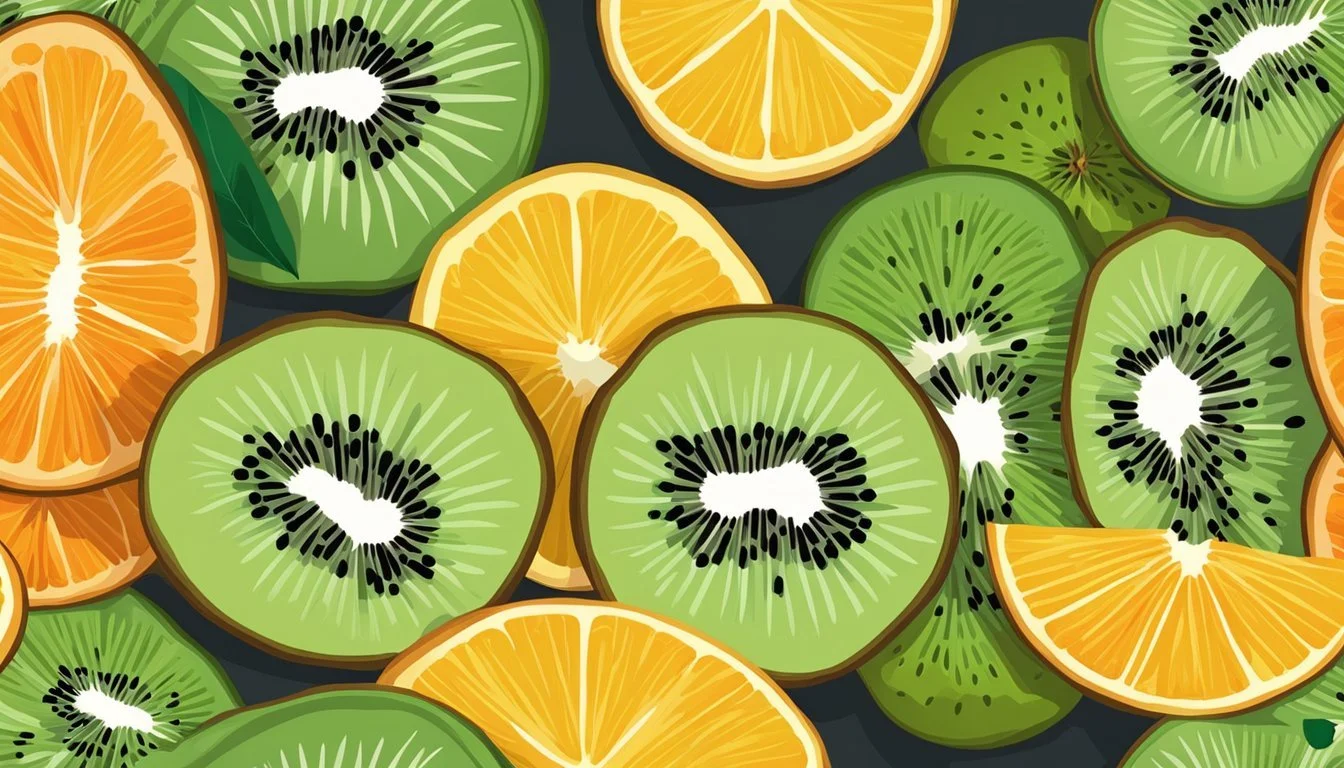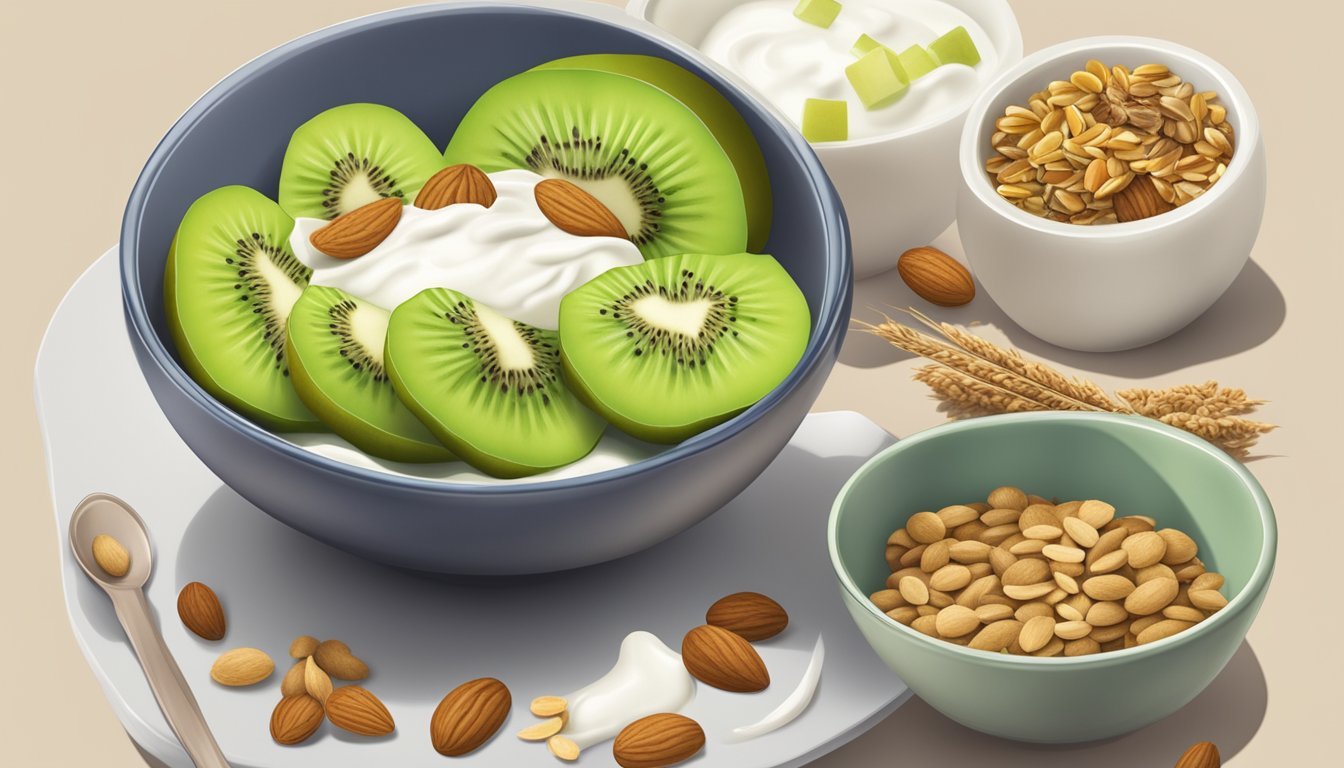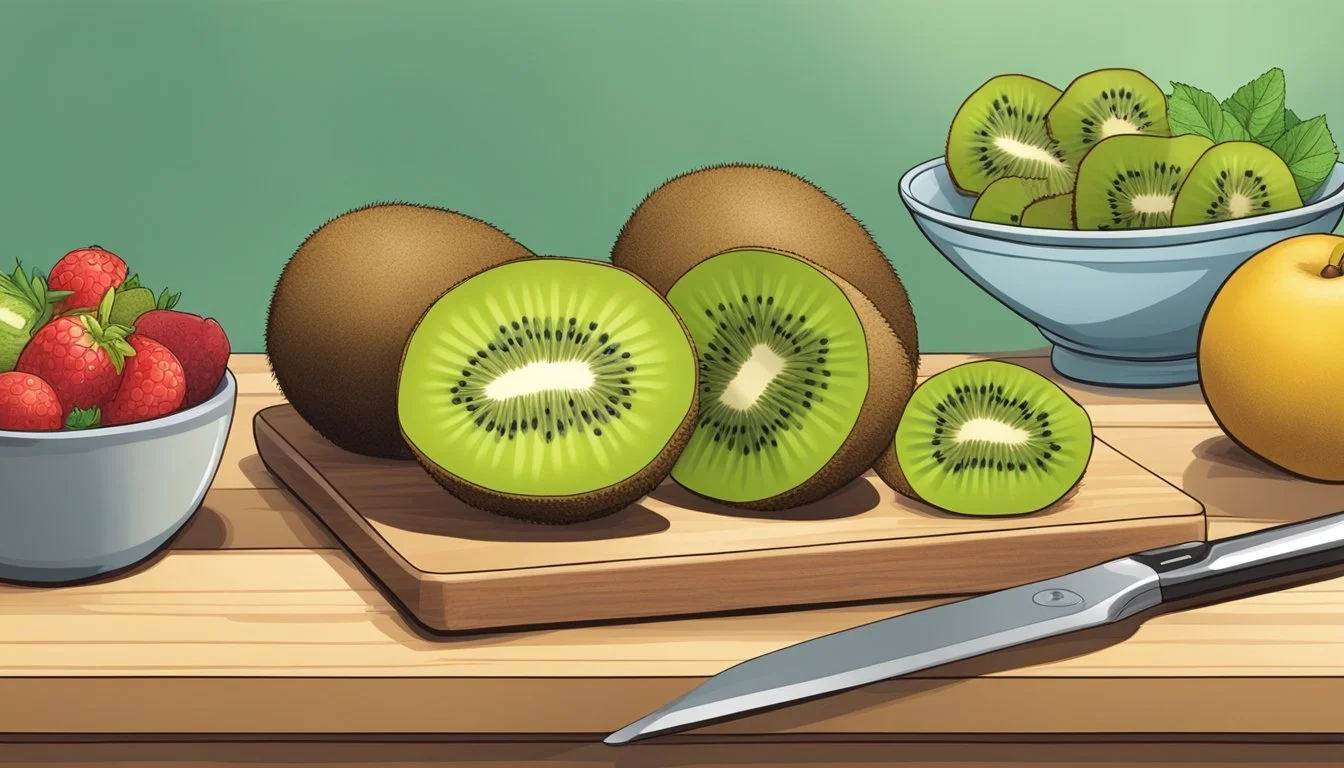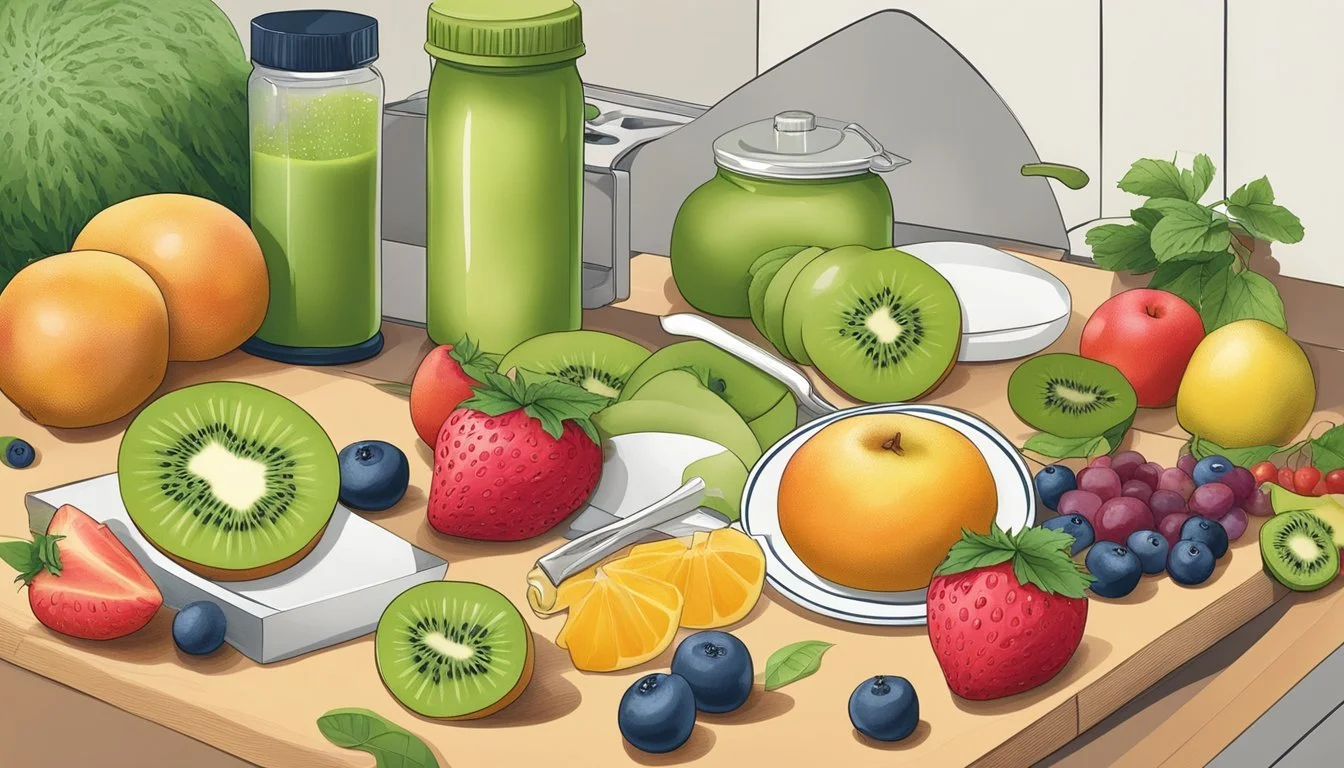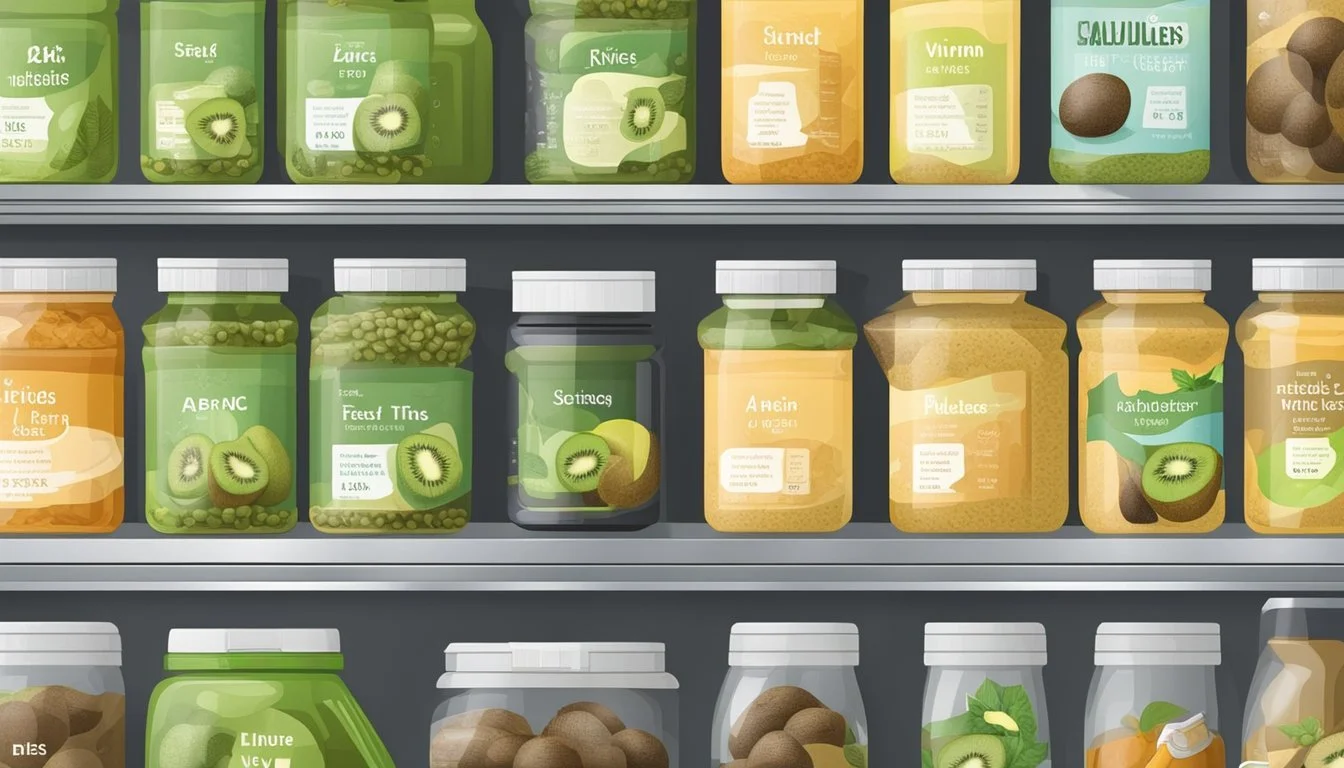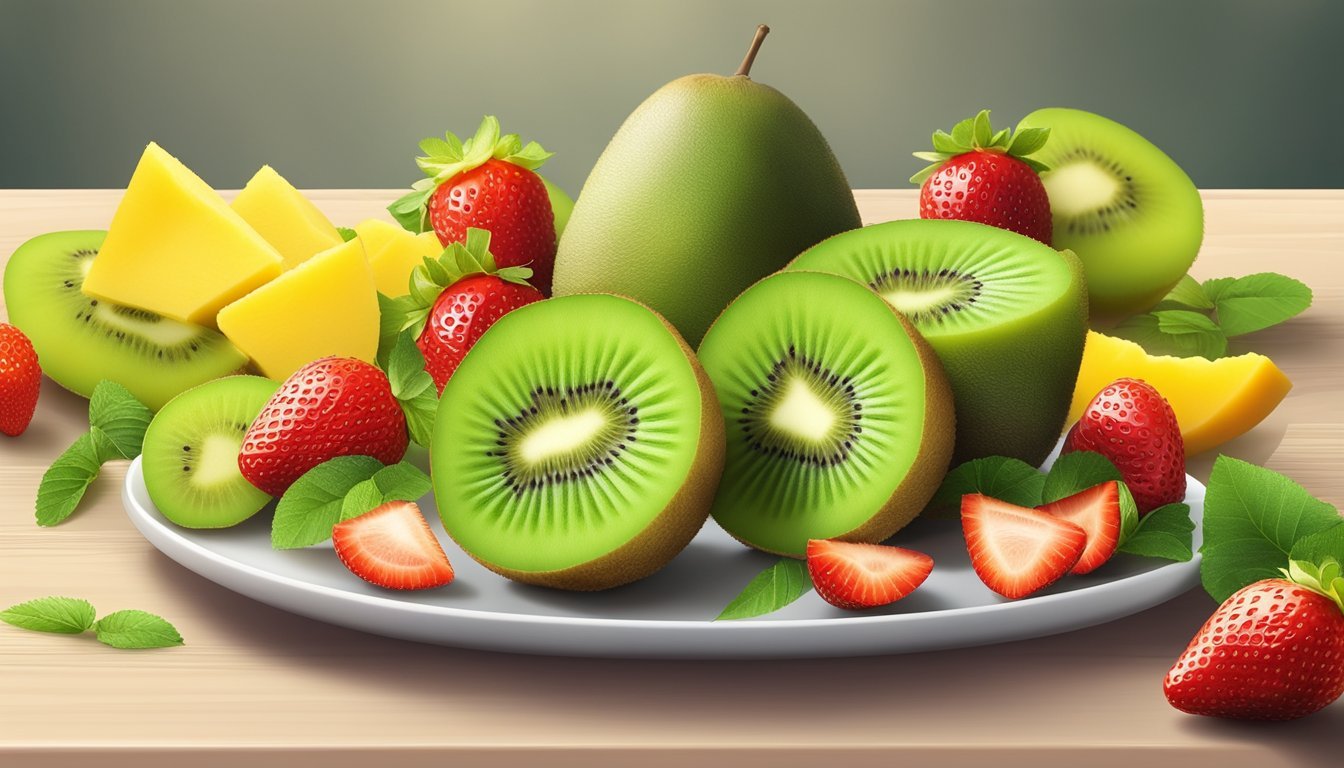Kiwi Substitutes
Top Alternatives for Your Fruit Needs
Finding a suitable substitute for kiwi can be a desirable option for those allergic to this fruit, unable to find it due to seasonal constraints, or simply looking for a variation in flavor or texture in a recipe. Kiwi is well-regarded for its distinctive taste, which is often described as a mix of strawberry and banana with hints of pineapple and citrus, and for its small, edible black seeds that provide a unique mouthfeel. Its flavor profile is both tart and sweet, making it a versatile ingredient in desserts, salads, and as a garnish.
When searching for kiwi substitutes, it's important to consider why the kiwi is being replaced and what role it plays in the dish. For texture and a comparable flavor, strawberries combined with a dash of lime juice can offer a similar sweet-tart balance with a comparable seed texture. Other fruits that may be used include ripe pears with a squeeze of lemon or lime juice, which provide a tender flesh and a zesty kick, and dragon fruit, which has a kiwi-like appearance and a mildly sweet taste.
For recipes that require the kiwi's bright green color, honeydew melon can be an excellent alternative. Honeydew offers a sweet, subtly-flavored flesh and a similar color, with the additional benefits of providing vitamin C, potassium, and other nutrients. It should be noted that while these substitutes can mimic certain attributes of kiwi, each also brings its own unique qualities to a dish, and the result will not be an exact replica of the original kiwi flavor or appearance.
Why Substitute Kiwi?
In various situations, individuals and chefs might seek alternatives to kiwi, whether due to taste preference, nutritional considerations, or simple availability. The following subsections break down the why and what of choosing the right kiwi substitute.
Texture Considerations
The texture of kiwi is distinct—it possesses a soft texture with tiny black seeds contributing a slight crunch. Substitutes with a similar consistency, such as certain melons or berries, could therefore be a crisp texture alternative. For a soft texture option, ripe pears may suffice.
Taste Profile
Kiwi is known for its unique flavor that balances sweetness with a tangy flavor. Substitutes should ideally offer a similar acidity and tartness, such as a combination of strawberries and lime juice, to replicate the sweet and tart taste of kiwi. These flavors should mimic the original to satisfy the palate.
Nutritional Aspects
Kiwi is a nutritional powerhouse, offering vitamin C, vitamins A and E, dietary fiber, and antioxidants. Alternatives may not always match these nutritional values, but they should contribute beneficial minerals, potassium, and other vitamins to support heart health and digestion.
Allergies and Dietary Restrictions
For individuals with kiwi allergies or dietary restrictions, finding a suitable fruit that does not compromise their health benefits or trigger any health issues is crucial. Fruits such as mangoes and papayas might be safer options, as they offer similar nutritional aspects without the allergens kiwi might contain.
Availability
Kiwi is cultivated in countries like China, Italy, New Zealand, and the United States. However, it might not be accessible to all year-round. Seasonal and local market availability can prompt the search for a readily available substitute like honeydew, which can be found in many local produce sections.
Cost Considerations
The price of kiwis can vary by region and season, potentially making them a pricier option. Searching for cost-effective substitutes that still provide a balance of flavor and nutrition can be practical for budget-conscious consumers. Local fruits typically offer a more affordable alternative due to lower transportation and storage costs.
Best Kiwi Substitutes
When looking to replace kiwis, it's essential to consider flavor, texture, and nutritional value. Below are some choice fruit substitutes for kiwis, whether in fruit salads, smoothies, or desserts.
Fruit-Based Alternatives
Strawberries & Lime: Combining strawberries with a splash of lime juice offers a texture that closely resembles kiwi, replete with small seeds for a similar mouthfeel.
Ripe Pear & Citrus Juice: A ripe pear drizzled with lemon or lime juice can mimic kiwi's sweetness and provide a comparable texture.
For Sweetness and Texture
Mango and Papaya: These tropical fruits bring a sweetness and creaminess to dishes, much like that of a ripe kiwi. When ripe, these fruits exhibit a tenderness that suits textures expected in kiwi-based desserts.
Banana: For a sweet and filling alternative, bananas offer a great texture and can contribute to the creaminess in smoothies and fruit salads.
For Tanginess and Acidity
Citrus Fruits: Lemon and lime can infuse a tangy flavor that kiwis typically provide. These can be used to accentuate the tartness in other fruit substitutes or used in dressings and sauces for an acidic bite.
For Visual Appeal
Dragon Fruit (Pitaya): With its bright color and unique shape, dragon fruit can stand in for kiwi when the visual presentation is key, especially in fruit platters and exotic dishes.
For Nutritional Content
Kiwi Substitutes:
Fruit Nutrients Offered Mango Vitamin C, Vitamin E, dietary fiber Papaya Vitamin C, folate, Vitamin A, dietary fiber Banana Potassium, Vitamin B6, manganese Dragon Fruit Antioxidants, Vitamin C, fiber
These fruits each offer a unique set of vitamins and minerals that can compensate for the nutritional content typically provided by kiwis.
In Baking and Cooking
Peaches and Pears: Peaches and pears can be used as substitutes in baking recipes like cakes, tarts, and muffins for a sweetness and soft texture akin to kiwi.
Honeydew: In recipes where kiwi's tender texture is desired, honeydew melon can be a substitute that maintains moisture without overpowering other flavors.
Non-Fruit Alternatives
When considering substitutes for kiwi in various culinary applications, it's important to explore non-fruit alternatives, especially when replicating the functionality rather than flavor is the goal. These alternatives offer benefits such as altered consistency, additional dietary fiber, or enhanced sweetness without the use of actual fruit.
For Thickening Smoothies
To achieve the thick and creamy texture that kiwi adds to smoothies, chia seeds or ground flaxseeds can be used. These seeds are high in fiber and swell when mixed with liquid, providing a desirable consistency. They also contribute beneficial nutrients without adding a pronounced flavor.
Chia Seeds: Add 1 tablespoon per cup of liquid and let sit for a few minutes to thicken.
Ground Flaxseeds: Use 1 tablespoon per cup of liquid and blend well.
As a Sweetening Agent
For those looking to maintain the sweet flavor of kiwi without the sugar content, stevia or erythritol can be good alternatives. Both are non-nutritive sweeteners that have little to no effect on blood sugar levels, making them suitable for a range of diets.
Stevia: Start with a pinch and adjust to taste, as it is much sweeter than sugar.
Erythritol: Substitute on a 1:1 ratio with the amount of sweetness desired from kiwi.
Using Flavor Extracts
Kiwi's distinctive taste can be simulated in recipes through the use of flavor extracts. Kiwi extract is an option, offering a concentrated flavor without the need for the fruit itself. It's useful in baked goods, confections, and beverages where a fruit substitute for flavor, rather than texture or nutritional content, is sought.
Kiwi Extract: Typically, a few drops are enough to impart flavor, depending on the product and desired taste intensity.
Preparing Kiwi Substitutes
When opting for a kiwi substitute in recipes, it's crucial to address the unique characteristics of kiwi: its texture, flavor, and preparation method. Ensuring a close match is essential for fruit salads, desserts, and salsas where kiwi’s distinctiveness is highlighted.
Cutting and Peeling
Selecting the right substitute involves understanding how to properly cut and peel the fruit to resemble the consistency and appearance of kiwi. For example, mangoes and papayas should be peeled using a paring knife, and the flesh sliced to mirror kiwi’s soft texture. This is especially important in dishes like fruit salads where the visual likeness contributes significantly to the overall appeal.
Matching Kiwi's Texture
Kiwi's texture is notably soft yet can hold its shape. To replicate this balance:
Mango: Offers a similarly soft texture and should be chosen when ripe to ensure the proper consistency.
Strawberries: Although smaller, when cut they can approximate the juiciness and soft texture of kiwi, making them suitable for smoothies or fruit salads.
Honeydew melon: Its flesh can mimic the softness of kiwi and is particularly effective when diced for salsa or desserts.
Dragon fruit: It has a crisp texture with small seeds that can serve as a visual stand-in for kiwi, especially in more exotic dishes.
Balancing Flavors
Kiwi is unique in its sweet and tart flavor profile, with a tangy taste that is often a blend of sweetness with a hint of acidity. Substitutes should, therefore, be chosen and prepared to mimic this balance.
Strawberries: By adding a splash of lime juice, one can enhance the tartness, resembling kiwi's acidity.
Papaya: This fruit is milder and can be mixed with lemon or lime juice to uplift its tanginess appropriate for desserts or smoothies.
Honeydew: While sweeter, can be balanced with a tad of lemon juice to increase its tart flavor, particularly for a refreshing fruit salad.
Incorporating Substitutes in Recipes
When adapting recipes to accommodate the absence of kiwis, a cook's focus should be on maintaining the balance of sweetness, flavor, and texture. Selecting an appropriate substitute requires considering the specific role kiwis play in the recipe.
In Fruit Salads
In fruit salads, the goal is to match the tangy sweetness and slight tartness of kiwi. Mangoes can be a close substitute, providing a juicy and fibrous texture. Here are specific proportions to use:
Mango: 1 cup diced, for every cup of sliced kiwi.
Strawberries: Add a squeeze of lime for extra tartness.
Papaya: Dice the fruit to mimic kiwi's bite-sized pieces.
For maintaining the consistency one expects in fruit salads, these substitutes should be fresh and ripe to avoid an unpleasantly firm or mushy texture.
In Desserts
When incorporating substitutes in desserts, the focus is on complementing the overall taste profile and achieving a similar mouthfeel. The following can be used:
Strawberries with Lime Juice: The blend captures the essence of kiwi's bright, acidic edge, excellent for tarts or parfaits.
Dragon Fruit: It contributes visually to desserts like pavlovas or fruit tarts due to its kiwi-like appearance.
One should carefully adjust sweetness levels, as substitutes may differ in sugar content compared to kiwis.
In Savory Dishes
Substitutes in savory dishes such as salsas must offer a balance between sweetness and tartness, aligning with kiwi's profile. Here are a few savory applications:
Pear with Lemon Juice: This combination provides a crisp texture that pairs well with savory ingredients, akin to kiwi's role in a salsa.
Honeydew Melon: Its succulent texture and subtle sweetness make it a fit for chilled soups or green salsas.
Texture is paramount; thus, the firmness of honeydew melon should be considered to ensure it holds up in the cooking process.
Storage and Shelf Life of Substitutes
When considering kiwi substitutes for recipes such as fruit salads, desserts, or smoothies, it's important to understand their storage requirements and shelf life to maintain freshness and nutrient integrity.
Refrigeration and Room Temperature
Fruit Substitutes:
Starfruit (Carambola): Refrigerate for up to 1 week.
Kiwi Berries: Store in the refrigerator; consume within 7-14 days.
Dragon Fruit (Pitaya): Refrigerate ripe fruit for 5-7 days; unripe can sit at room temperature to ripen.
Strawberries: Refrigerate; they typically last 3-7 days.
Temperature Guidelines:
Fruit Substitutes Refrigeration Room Temperature Starfruit Up to 1 week Only until ripe Kiwi Berries 7-14 days Not recommended Dragon Fruit (Pitaya) 5-7 days Until ripe Strawberries 3-7 days Only for few hours
Ripening and Usage
Substitutes must be properly ripened before use to maximize their flavor profile in dishes. Kiwi berries and strawberries are best used when they are fully ripe, as indicated by their vibrant color and slight softness to the touch. Dragon fruit and starfruit will continue to ripen at room temperature; once they yield to gentle pressure, they are ready for refrigeration or immediate use.
Preserving Nutrients
To retain the antioxidants, vitamins, and other nutrients present in kiwi substitutes, proper storage is essential.
Starfruit and Dragon Fruit: Store properly to prevent nutrient degradation.
Kiwi Berries and Strawberries: Lessen exposure to light and avoid excess moisture to maintain their nutrient content.
Nutrient Preservation:
Refrigerate in airtight containers or designated produce drawers.
Use within the recommended time frames to enjoy their peak nutritional value.
Health Considerations of Kiwi Substitutes
Kiwi fruit is known for its rich nutrient profile that contributes positively to health. Substitutes for kiwi can offer varied health benefits, including digestive support and a supply of essential vitamins and minerals. However, one should consider their potential impact on blood sugar and cholesterol.
Digestive Health and Fiber Content
Kiwi substitutes like pear and banana can provide differing levels of dietary fiber, beneficial for digestive health. Bananas are recognized for their content of soluble fiber, which aids in digestion and adds bulk to stool. Pears, rich in both soluble and insoluble fiber, can help regulate bowel movements and prevent constipation.
Banana: High in dietary fiber, contributing to a feeling of fullness
Pear: Contains both soluble and insoluble fiber, promoting gut health
Vitamin and Mineral Boost
Substituting kiwi with fruits like mango, papaya, and strawberries can ensure a continued intake of various vitamins and minerals. Mangoes and papayas are high in vitamins A, C, and E, and possess magnesium and potassium, which are vital for maintaining heart health. Strawberries, enhanced with a squeeze of lime juice, may closely match the vitamin C levels found in kiwis.
Mango: Rich in vitamin A, contributes to immune and eye health
Papaya: Good source of vitamin C and potassium, supports heart function
Strawberries: High vitamin C content, especially with added lime juice
Impact on Blood Sugar and Cholesterol
When selecting a kiwi substitute, it is essential to consider its glycemic index and cholesterol impact. Bananas have higher sugar content that might influence blood sugar levels more significantly than kiwis. Choosing substitutes like honeydew melon and dragon fruit, which contain less sugar and are low in cholesterol, could better support individuals monitoring their blood sugar or cholesterol levels.
Banana: High in sugar, may affect blood sugar levels
Honeydew melon: Low in fat, cholesterol, and sodium, beneficial for those watching cholesterol numbers
Conclusion
When selecting a substitute for kiwi, individuals have several fruit options that can emulate the unique taste and texture of kiwi to varying degrees. Bananas are noted for their sweet flavor and filling nature, though they have higher sugar content. They are an excellent choice for smoothies and baking where a sweet, creamy texture is desired.
In contrast, combining strawberries with lime juice is suggested to capture a similar taste to kiwi, especially when one is looking for that balance of sweet and tangy. For a more textured experience, ripe pears with a splash of citrus can provide a comparable bite.
Fruits like mango and papaya score high for their tropical flavor profiles and are preferred for their similarity in consistency to kiwi. Their vibrant colors also make dishes visually appealing. Another visually similar fruit, dragon fruit (or pitaya), with its kiwi-like seeds, offers a mild taste that pairs well with other fruits in salads and desserts.
Lastly, honeydew melon stands out as a kiwi alternative that is not only juicy but comes with health benefits from its vitamin and mineral content, imparting a more subtle flavor.
For each alternative:
Bananas: Sweet, creamy, best for smoothies and baking.
Strawberries and Lime: Mimics kiwi's tanginess, good for fresh applications.
Ripe Pear and Citrus: Provides similar texture, suitable for diverse use.
Mango and Papaya: Tropical taste, close in consistency to kiwi.
Dragon Fruit: Visually similar with mild flavor, best for salads.
Honeydew Melon: Subtle taste, packed with nutrients, versatile in use.
Each substitute presents its unique characteristics and can be chosen based on the specific requirements of the recipe or personal taste preferences.

